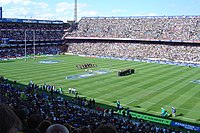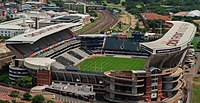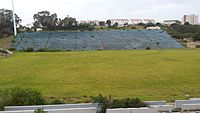Loading AI tools
Men's rugby union event in South Africa From Wikipedia, the free encyclopedia
The 1995 Rugby World Cup (Afrikaans: Rugbywêreldbeker 1995), was the third Rugby World Cup. It was hosted and won by South Africa, and was the first Rugby World Cup in which every match was held in one country.
| Afrikaans: Rugbywêreldbeker 1995 | |
|---|---|
 | |
| Tournament details | |
| Host nation | |
| Dates | 25 May – 24 June (31 days) |
| No. of nations | 16 (52 qualifying) |
| Final positions | |
| Champions | |
| Runner-up | |
| Third place | |
| Tournament statistics | |
| Matches played | 32 |
| Attendance | 938,486 (29,328 per match) |
| Top scorer(s) | |
| Most tries | (7 tries each) |
← 1991 1999 → | |
The World Cup was the first major sporting event to take place in South Africa following the end of apartheid. It was also the first World Cup in which South Africa was allowed to compete; the International Rugby Football Board (IRFB, now World Rugby) had only readmitted South Africa to international rugby in 1992, following negotiations to end apartheid. The World Cup was also the last major event of rugby union's amateur era; two months after the tournament, the IRFB opened the sport to professionalism.
In the final, held at Ellis Park in Johannesburg on 24 June, South Africa defeated New Zealand 15–12, with Joel Stransky scoring a drop goal in extra time to win the match. Following South Africa's victory, Nelson Mandela, the President of South Africa, wearing a Springboks rugby shirt and cap, presented the Webb Ellis Cup to the South African captain François Pienaar.
| Africa | Americas | Europe | Oceania/Asia |
|---|---|---|---|
|
|
The eight quarter-finalists from the 1991 Rugby World Cup all received automatic entry, as did South Africa, as hosts. The remaining seven of the 16 positions available in the tournament were filled by regional qualifiers. The qualifying tournaments were broken up into regional associations: Africa, the Americas, Asia, Europe and Oceania. Côte d'Ivoire qualified through Africa, Japan through Asia, Argentina through the Americas, Italy, Romania and Wales through Europe, Tonga through Oceania.
The 1995 tournament was the first Rugby World Cup to be hosted by just one country, and thus, all the venues are within the one country. South Africa were given the rights to host the tournament in 1993, after a meeting between the IRB and both the government led by F. W. de Klerk and the African National Congress.[1] In total, nine stadiums were used for the World Cup, most being owned by local municipalities, and the majority of the venues were upgraded prior to the tournament. Six of the nine stadiums were South African Test grounds. The four largest stadiums were used for the finals, with the final taking place at Johannesburg's Ellis Park.
There were games originally scheduled to have been played in Brakpan, Germiston, Pietermaritzburg and Witbank, but these games were reallocated to other venues. This reduced the number of venues from 14 to 9. The reasons cited for this change had to do with facilities for both the press and spectators, as well as the security. The change in the itinerary occurred in January 1994. Further changes occurred in April, so that evening games were played at stadiums with good floodlighting. It is also thought that Potchefstroom was an original venue.
Venues were paired:
| Johannesburg | Pretoria | Cape Town | |||
|---|---|---|---|---|---|
| Ellis Park | Loftus Versfeld | Newlands | |||
| Capacity: 60,000 | Capacity: 50,000 | Capacity: 50,000 | |||
 |
 |
 | |||
| Durban | Bloemfontein | Port Elizabeth | |||
| Kings Park Stadium | Free State Stadium | Boet Erasmus Stadium | |||
| Capacity: 50,000 | Capacity: 40,000 | Capacity: 38,950 | |||
 |
 |
 | |||
| Rustenburg | East London | Stellenbosch | |||
| Olympia Park | Basil Kenyon Stadium | Danie Craven Stadium | |||
| Capacity: 30,000 | Capacity: 22,000 | Capacity: 16,000 | |||
| Pool A | Pool B | Pool C | Pool D |
|---|---|---|---|
The tournament was contested by 16 nations using the same format that was used in 1987 and 1991 and in total 32 matches were played. The competition began on 25 May, when the hosts South Africa defeated Australia 27–18 at Newlands in Cape Town. The tournament culminated with the final between South Africa and the All Blacks at Ellis Park in Johannesburg on 24 June. In total, the tournament ran for thirty days. The nations were broken up into four pools of four, with each pool consisting of two teams that were automatically qualified and two that went through the qualifying tournaments.
The points system that was used in the pool stage was unchanged from 1991:
Pool winners were drawn against opposite pool runners-up in the quarter-finals. For example, the winner of A faces the runner up of B, and the winner of B face the runner-up of A. The whole finals stage adopts a knock-out format, and the winners of the quarter-finals advance to the semi-finals, where winner 1 faces winner 2, and winner 3 faces winner 4. The winners advance to the final, and the losers contest a third/fourth place play-off two days before the final.
A total of 32 matches (24 pool stage & 8 knock-out) were played throughout the tournament over 30 days from 25 May to 24 June 1995.
| Pos | Team | Pld | W | D | L | PF | PA | PD | Pts |
|---|---|---|---|---|---|---|---|---|---|
| 1 | 3 | 3 | 0 | 0 | 68 | 26 | +42 | 9 | |
| 2 | 3 | 2 | 0 | 1 | 87 | 41 | +46 | 7 | |
| 3 | 3 | 1 | 0 | 2 | 45 | 50 | −5 | 5 | |
| 4 | 3 | 0 | 0 | 3 | 14 | 97 | −83 | 3 |
| 25 May 1995 |
| South Africa | 27–18 | |
| Try: Hendriks 37' m Stransky 63' c Con: Stransky (1/2) 64' Pen: Stransky (4/4) 5', 21', 29', 45' Drop: Stransky (1/3) 49' | Report | Try: Lynagh 33' c Kearns 78' m Con: Lynagh (1/2) 34' Pen: Lynagh (2/3) 3', 17' |
| Newlands, Cape Town Attendance: 44,778 Referee: Derek Bevan (Wales) |
| 26 May 1995 |
| Canada | 34–3 | |
| Try: Charron McKenzie Snow Con: Rees (2) Pen: Rees (4) Drop: Rees | Pen: Nichitean |
| Boet Erasmus Stadium, Port Elizabeth Attendance: 8,000 Referee: Colin Hawke (New Zealand) |
| 30 May 1995 |
| South Africa | 21–8 | |
| Try: Richter (2) Con: Johnson Pen: Johnson (3) | Try: Gurănescu Pen: Ivanciuc |
| Newlands, Cape Town Attendance: 45,000 Referee: Ken McCartney (Scotland) |
| 31 May 1995 |
| Australia | 27–11 | |
| Try: Lynagh Tabua Roff Con: Lynagh (3) Pen: Lynagh (2) | Try: Charron Pen: Rees (2) |
| Boet Erasmus Stadium, Port Elizabeth Attendance: 16,000 Referee: Patrick Robin (France) |
| 3 June 1995 |
| Australia | 42–3 | |
| Try: Smith Wilson Roff (2) Foley Burke Con: Burke (2) Eales (4) | Pen: Ivanciuc |
| Danie Craven Stadium, Stellenbosch Attendance: 15,542 Referee: Naoki Saito (Japan) |
| 3 June 1995 |
| South Africa | 20–0 | |
| Try: Richter (2) Con: Stransky (2) Pen: Stransky (2) |
| Boet Erasmus Stadium, Port Elizabeth Attendance: 31,000 Referee: David McHugh (Ireland) |
| Pos | Team | Pld | W | D | L | PF | PA | PD | Pts |
|---|---|---|---|---|---|---|---|---|---|
| 1 | 3 | 3 | 0 | 0 | 95 | 60 | +35 | 9 | |
| 2 | 3 | 2 | 0 | 1 | 96 | 88 | +8 | 7 | |
| 3 | 3 | 1 | 0 | 2 | 69 | 94 | −25 | 5 | |
| 4 | 3 | 0 | 0 | 3 | 69 | 87 | −18 | 3 |
| 27 May 1995 |
| Italy | 18–42 | |
| Try: Vaccari Cuttitta Con: Dominguez Pen: Dominguez Drop: Dominguez | Report | Try: Lima (2) Harder (2) Kellett Tatupu Con: Kellett (3) Pen: Kellett (2) |
| Basil Kenyon Stadium, East London Attendance: 7,868 Referee: Joël Dume (France) |
| 27 May 1995 |
| Argentina | 18–24 | |
| Try: Arbizu Noriega Con: Arbizu Pen: Arbizu (2) | Pen: Andrew (6) Drop: Andrew (2) |
| Kings Park Stadium, Durban Attendance: 35,000 Referee: Jim Fleming (Scotland) |
| 30 May 1995 |
| Western Samoa | 32–26 | |
| Try: Lam Leaupepe Harder Con: Kellett Pen: Kellett (5) | Try: Penalty try Crexell Con: Cilley (2) Pen: Cilley (4) |
| Basil Kenyon Stadium, East London Attendance: 7,960 Referee: Dave Bishop (New Zealand) |
| 31 May 1995 |
| England | 27–20 | |
| Try: R. Underwood T. Underwood Con: Andrew Pen: Andrew (5) | Try: Cuttitta Vaccari Con: Dominguez (2) Pen: Dominguez (2) |
| Kings Park Stadium, Durban Attendance: 45,093 Referee: Stephen Hilditch (Ireland) |
| 4 June 1995 |
| Argentina | 25–31 | |
| Try: Martín Penalty try Corral Cilley Con: Cilley Pen: Cilley | Try: Vaccari Gerosa Dominguez Con: Dominguez (2) Pen: Dominguez (4) |
| Basil Kenyon Stadium, East London Attendance: 7,571 Referee: Clayton Thomas (Wales) |
| 4 June 1995 |
| England | 44–22 | |
| Try: R. Underwood (2) Back Penalty try Con: Callard (3) Pen: Callard(5) Drop: Catt | Try: Sini (2) Umaga Con: Fa'amasino (2) Pen: Fa'amasino |
| Kings Park Stadium, Durban Attendance: 35,000 Referee: Patrick Robin (France) |
| Pos | Team | Pld | W | D | L | PF | PA | PD | Pts |
|---|---|---|---|---|---|---|---|---|---|
| 1 | 3 | 3 | 0 | 0 | 222 | 45 | +177 | 9 | |
| 2 | 3 | 2 | 0 | 1 | 93 | 94 | −1 | 7 | |
| 3 | 3 | 1 | 0 | 2 | 89 | 68 | +21 | 5 | |
| 4 | 3 | 0 | 0 | 3 | 55 | 252 | −197 | 3 |
| 27 May 1995 |
| Japan | 10–57 | |
| Try: Ota (2) | Try: G. Thomas (3) I. Evans (2) Moore Taylor Con: N. Jenkins (5) Pen: N. Jenkins (4) |
| Free State Stadium, Bloemfontein Attendance: 15,000 Referee: Efrahim Sklar (Argentina) |
| 27 May 1995 |
| Ireland | 19–43 | |
| Try: Corkery McBride Halpin Con: Elwood (2) | Try: Lomu (2) Kronfeld Bunce Osborne Con: Mehrtens (3) Pen: Mehrtens (4) |
| Ellis Park, Johannesburg Attendance: 38,000 Referee: Wayne Erickson (Australia) |
| 31 May 1995 |
| Ireland | 50–28 | |
| Try: Francis Geoghegan Corkery Halvey Hogan Penalty try (2) Con: Burke (6) Pen: Burke | Try: Latu Izawa Hirao Takura Con: Yoshida (4) |
| Free State Stadium, Bloemfontein Attendance: 15,000 Referee: Stef Neethling (South Africa) |
| 31 May 1995 |
| New Zealand | 34–9 | |
| Try: Ellis Little Kronfeld Con: Mehrtens (2) Pen: Mehrtens (4) Drop: Mehrtens | Pen: N. Jenkins (2) Drop: N. Jenkins |
| Ellis Park, Johannesburg Attendance: 45,000 Referee: Ed Morrison (England) |
| 4 June 1995 |
| Japan | 17–145 | |
| Try: Kajihara (2) Con: Hirose (2) Pen: Hirose | Report | Try: Ellis (6) Rush (3) Wilson (3) R. Brooke (2) Osborne (2) Loe Culhane Henderson Dowd Ieremia Con: Culhane (20) |
| Free State Stadium, Bloemfontein Attendance: 25,000 Referee: George Gadjovic (Canada) |
| 4 June 1995 |
| Ireland | 24–23 | |
| Try: Halvey Popplewell McBride Con: Elwood (3) Pen: Elwood | Try: Humphreys Taylor Con: N. Jenkins (2) Pen: N. Jenkins (2) Drop: A. Davies |
| Ellis Park, Johannesburg Attendance: 40,000 Referee: Ian Rogers (South Africa) |
| Pos | Team | Pld | W | D | L | PF | PA | PD | Pts |
|---|---|---|---|---|---|---|---|---|---|
| 1 | 3 | 3 | 0 | 0 | 114 | 47 | +67 | 9 | |
| 2 | 3 | 2 | 0 | 1 | 149 | 27 | +122 | 7 | |
| 3 | 3 | 1 | 0 | 2 | 44 | 90 | −46 | 5 | |
| 4 | 3 | 0 | 0 | 3 | 29 | 172 | −143 | 3 |
| 26 May 1995 |
| Ivory Coast | 0–89 | |
| Try: G. Hastings (4) Logan (2) Walton (2) Wright Chalmers Stanger Burnell Shiel Con: G. Hastings (9) Pen: G. Hastings (2) |
| Olympia Park, Rustenburg Attendance: 20,000 Referee: Felise Vito (Western Samoa) |
| 26 May 1995 |
| France | 38–10 | |
| Try: Lacroix (2) Hueber Saint-André Con: Lacroix (3) Pen: Lacroix (3) Drop: Delaigue | Try: Vaʻenuku Con: Tu'ipulotu Pen: Tu'ipulotu |
| Loftus Versfeld, Pretoria Attendance: 22,000 Referee: Steve Lander (England) |
| 29 May 1995 |
| France | 54–18 | |
| Try: Lacroix (2) Benazzi Téchoueyres Viars Accoceberry Saint-André Costes Con: Deylaud (2) Lacroix (2) Pen: Lacroix (2) | Try: Soulama Camara Con: Kouassi Pen: Kouassi (2) |
| Olympia Park, Rustenburg Attendance: 10,000 Referee: Han Moon-Soo (South Korea) |
| 29 May 1995 |
| Scotland | 41–5 | |
| Try: S. Hastings Peters G. Hastings Con: G. Hastings Pen: G. Hastings (8) | Try: Fenukitau |
| Loftus Versfeld, Pretoria Attendance: 21,000 Referee: Barry Leask (Australia) |
| 3 June 1995 |
| Ivory Coast | 11–29 | |
| Try: Okou Pen: Dali (2) | Try: Penalty try Latukefu Otai Tu'ipulotu Con: Tu'ipulotu (3) Pen: Tu'ipulotu |
| Olympia Park, Rustenburg Attendance: 15,000 Referee: Don Reordan (United States) |
Three minutes into the match between Ivory Coast and Tonga, the Ivorian winger Max Brito was crushed beneath several other players, leaving him paralysed below the neck.[3]
| 3 June 1995 |
| France | 22–19 | |
| Try: Ntamack Con: Lacroix Pen: Lacroix (5) | Try: Wainwright Con: G. Hastings Pen: G. Hastings (4) |
| Loftus Versfeld, Pretoria Attendance: 39,000 Referee: Wayne Erickson (Australia) |
| Quarter-finals | Semi-finals | Final | ||||||||
| 10 June – Johannesburg | ||||||||||
| 42 | ||||||||||
| 17 June – Durban | ||||||||||
| 14 | ||||||||||
| 19 | ||||||||||
| 10 June – Durban | ||||||||||
| 15 | ||||||||||
| 36 | ||||||||||
| 24 June – Johannesburg | ||||||||||
| 12 | ||||||||||
| 15 | ||||||||||
| 11 June – Cape Town | ||||||||||
| 12 | ||||||||||
| 25 | ||||||||||
| 18 June – Cape Town | ||||||||||
| 22 | ||||||||||
| 29 | ||||||||||
| 11 June – Pretoria | ||||||||||
| 45 | Third place | |||||||||
| 48 | ||||||||||
| 22 June – Pretoria | ||||||||||
| 30 | ||||||||||
| 19 | ||||||||||
| 9 | ||||||||||
| 10 June 1995 |
| France | 36–12 | |
| Try: Saint-André 79' c Ntamack 80' m Con: Lacroix (1/2) 80' Pen: Lacroix (8) 7', 19', 30', 40', 49', 51', 71', 73' | Report | Pen: Elwood (4) 4', 15', 23', 39' |
| Kings Park Stadium, Durban Attendance: 20,000 Referee: Ed Morrison (England) |
| 10 June 1995 |
| South Africa | 42–14 | |
| Try: Williams (4) Rossouw Andrews Con: Johnson (3) Pen: Johnson (2) | Try: Tatupu Nu'uali'itia Con: Fa'amasino (2) |
| Ellis Park, Johannesburg Attendance: 54,169 Referee: Jim Fleming (Scotland) |
| 11 June 1995 |
| England | 25–22 | |
| Try: T. Underwood Con: Andrew Pen: Andrew (5) Drop: Andrew | Report | Try: Smith Con: Lynagh Pen: Lynagh (5) |
| Newlands, Cape Town Attendance: 35,448 Referee: Dave Bishop (New Zealand) |
| 11 June 1995 |
| New Zealand | 48–30 | |
| Try: Little (2) Lomu Mehrtens Bunce Fitzpatrick Con: Mehrtens (6) Pen: Mehrtens (2) | [4] | Try: Weir (2) S. Hastings Con: G. Hastings (3) Pen: G. Hastings (3) |
| Loftus Versfeld, Pretoria Attendance: 28,000 Referee: Derek Bevan (Wales) |
| 17 June 1995 |
| South Africa | 19–15 | |
| Try: Kruger Con: Stransky Pen: Stransky (4) | Pen: Lacroix (5) |
| Kings Park Stadium, Durban Attendance: 49,773 Referee: Derek Bevan (Wales) |
| 22 June 1995 |
| France | 19–9 | |
| Try: Olivier Roumat Ntamack Pen: Lacroix (3) | Pen: Andrew (3) |
| Loftus Versfeld, Pretoria Attendance: 44,000 Referee: Dave Bishop (New Zealand) |
The final was contested by New Zealand and hosts South Africa. Both nations finished undefeated at the top of their pools. South Africa defeated Western Samoa in the quarter-finals, and then France in the semi-finals to reach the final; New Zealand defeated Scotland in the quarter-finals, and England in the semi-finals, a game in which Jonah Lomu famously scored four tries for the All Blacks. The final was played at Ellis Park in Johannesburg and refereed by Ed Morrison of England. To this point, New Zealand had led the tournament in production, outscoring their opponents 315–104, while South Africa had outscored their opponents 129–55. The tight Springbok defence would keep the high scoring All Blacks in check – particularly Jonah Lomu and Marc Ellis, who had already scored a then World Cup record seven tries each in the tournament – with neither team scoring a try in the match.
South Africa led 9–6 at half time, and New Zealand levelled the scores at 9–9 with a drop goal in the second half. Though Andrew Mehrtens almost kicked a late drop goal for the All Blacks, the score remained tied at full-time, forcing the game into extra time. Both teams scored penalty goals in the first half of extra time, but Joel Stransky then scored a drop goal to win the final for South Africa.
What happened after the match has become an iconic moment in the history of the sport. Nelson Mandela, wearing a Springbok rugby jersey and cap, presented the Webb Ellis Cup to South African captain François Pienaar to the delight of the capacity crowd. The moment is thought by some to be one of the most famous finals of any sport.[5]
| 24 June 1995 |
| South Africa | 15–12 (a.e.t.) | |
| Pen: Stransky (3) Drop: Stransky (2) | Report | Pen: Mehrtens (3) Drop: Mehrtens |
| Ellis Park, Johannesburg Attendance: 59,870 Referee: Ed Morrison (England) |
The tournament's top point scorer was France's Thierry Lacroix, who scored 112 points. Marc Ellis and Jonah Lomu, both of New Zealand, scored the most tries, with seven each.
| Player | Team | Position | Played | Tries | Conversions | Penalties | Drop goals | Total points |
|---|---|---|---|---|---|---|---|---|
| Thierry Lacroix | Fly-half | 6 | 4 | 7 | 26 | 0 | 112 | |
| Gavin Hastings | Full-back | 4 | 5 | 14 | 17 | 0 | 104 | |
| Andrew Mehrtens | First five-eighth | 5 | 1 | 14 | 14 | 3 | 84 | |
| Rob Andrew | Fly-half | 5 | 0 | 5 | 20 | 3 | 79 | |
| Joel Stransky | Fly-half | 5 | 1 | 4 | 13 | 3 | 61 | |
| Michael Lynagh | Fly-half | 3 | 2 | 5 | 9 | 0 | 47 | |
| Simon Culhane | First five-eighth | 1 | 1 | 20 | 0 | 0 | 45 | |
| Neil Jenkins | Fly-half | 3 | 0 | 7 | 8 | 1 | 41 | |
| Diego Domínguez | Fly-half | 3 | 1 | 5 | 7 | 1 | 39 | |
| Marc Ellis | Wing | 5 | 7 | 0 | 0 | 0 | 35 | |
| Jonah Lomu | Wing | 5 | 7 | 0 | 0 | 0 | 35 |
The event was broadcast in Australia by Network Ten and in the United Kingdom by ITV.
The South African Mint issued a one-ounce gold proof "Protea" coin with a total mintage of 406 pieces to commemorate the event being hosted by South Africa.
Mandela and Pienaar's involvement in the World Cup is the subject of the John Carlin book Playing the Enemy: Nelson Mandela and the Game That Made a Nation, its 2009 film adaptation Invictus, and the ESPN TV documentary The 16th Man in 2010.
Seamless Wikipedia browsing. On steroids.
Every time you click a link to Wikipedia, Wiktionary or Wikiquote in your browser's search results, it will show the modern Wikiwand interface.
Wikiwand extension is a five stars, simple, with minimum permission required to keep your browsing private, safe and transparent.